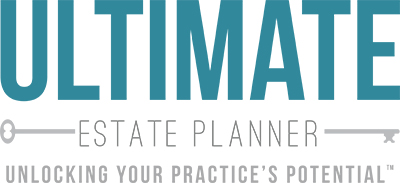8 Steps to Hiring a Great Executive Assistant
By Kristina Schneider, Practice Success Coach An executive assistant is an often overlooked position for many estate planning professionals. I know this because I often interact with a lot of attorneys, financial advisors, and CPAs directly on matters that I also know would be best handled by an executive assistant. Not having an executive assistant means that you, the executive, are often stuck with a lot of daily administrative tasks in the office. And that’s fine if that’s something that you enjoy doing and it works for you. But, for most estate planning professionals, that’s a huge misappropriation of the skills and value that you bring to the table.
An executive assistant is an often overlooked position for many estate planning professionals. I know this because I often interact with a lot of attorneys, financial advisors, and CPAs directly on matters that I also know would be best handled by an executive assistant. Not having an executive assistant means that you, the executive, are often stuck with a lot of daily administrative tasks in the office. And that’s fine if that’s something that you enjoy doing and it works for you. But, for most estate planning professionals, that’s a huge misappropriation of the skills and value that you bring to the table.
If you’re an attorney, you worked really hard to get through law school and pass the bar. If you’re a CPA, you took all those accounting courses, continuing education classes, and board exams. If you’re a financial advisor or life insurance agent, you worked hard to get all of the necessary schooling, training, designations, and licensing to be where you are today. These are specialized skills, which means that your highest and best use of your time is putting those skills to use. So, if you’re not meeting with clients, drafting legal work, preparing tax returns, processing financial transactions, or reviewing life insurance policies, then you’re not being fully utilized.
What you need is an executive assistant. And not just any assistant. One that’s dedicated to keeping you, attorney business owner, on task. If you don’t have someone safeguarding your time, attention, and looking out for you, then that leaves you open and vulnerable to all of the disruption and distractions that are guaranteed to come your way! And sometimes having a terrible assistant may be worse than not having one at all. You need a great executive assistant. One with the right skills and abilities to handle the administrative tasks that come with being an estate planning professional and a business owner. One with the directive that YOU are his or her priority.
As basic as it may be, I have put together the 8 steps to hiring and finding a great executive assistant.
Step 1: Put Together a Job Description.
First and foremost, you have to decide what you want your executive assistant to do.
You can start out by narrowing down the duties that this position will entail by listing out each and everything that you currently do each day. Then, once you have your own thorough duties list for what you do, cross out the tasks that only you can do. For example, only you can meet with clients and provide them legal (or financial or tax advice). From this list, you should be left with a number of tasks that are administrative. These include, but are not limited to, checking and responding to e-mail, answering the telephone, checking and returning voicemails, managing the calendar, making copies, pulling and putting away files, drafting correspondence, checking and going through mail, making travel arrangements, registering for educational programs, etc. This is a great place to start. If most professionals were to add up the time involved to do a lot of these tasks each day, they’d figure out that there are hours spent each and every day doing these things.
If, after making this list of items for your assistant, you’re worried that there are not enough things for this person to do to fill up an entire work day, that’s okay. This is where you can decide whether this person might also do other things for you. These could vary from running personal errands, assisting you with marketing and client contact, assistance with word processing and/or notarization, etc. There’s always other things that you do that could be taught to this person about your specific business, which will take the load off of you—the busy executive—and free you up to do the things that you’re good at (and hopefully, the things that you love!).
Step 2: Determine What Skills & Abilities the Executive Assistant Should Have.
The types of skills and abilities that you should be looking for in an executive assistant include organization, professional oral and written communication, the ability to multi-task, self-starter, ability to work independently, time management and the ability to prioritize tasks, as well as general computer literacy. Out of all of these skills, the most important one is organization. You need an assistant who is going to be organized and help you keep your office and work schedule organized. You need to be able to develop trust that they know where things are, that they know what’s going on, and that they will be able to handle the responsibilities given to them. The last thing you want is to have an assistant that is so disorganized that now you’re losing client files, or your calendar is in shambles or, worse yet, your clients are leaving messages for you that are going unanswered or are getting lost in a black hole.
Education and work experience is not nearly as important as you may think, because you might want to make this more of an entry-level position so you’re able to train this assistant the way you want (especially if you’re very particular about the way you want things done).
Finding a candidate with the skill set and the personality that will mesh with you is far more important!
Step 3: Determine Compensation.
The next issue is compensation. This varies both by where you are located (and the general cost of living in your area), but also by the level of experience of the executive assistant you seek. As a small company, you probably have a much tighter budget to watch, so you may wish to consider a more recent graduate or a candidate with only a few years of experience. Often times, these candidates are a more motivated and eager to learn, which will help you mold this assistant into what you need for your particular business.
To find a fair salary, a great place to start is by looking at websites like Salary.com or the Salary Guides at RobertHalf.com and determine the pay range for an executive assistant in your region. You may opt for a slightly lower base pay, and weigh in factors such as benefits and any bonus systems you may have in place for your staff. (By the way, if you don’t have a staff bonus structure in place yet, you’ll definitely want to check out our program “8 Steps to Setting Up Bonuses for Support Staff That Are Legal, Ethical and Motivate Them“, which will cover how to set up a staff bonus system that is legal, ethical, creates a team-approach to your firm, and also helps make more money—for both the firm and for the staff!)
Step 4: Finding Candidates.
The next step is to draft up the job ad and determine where you will go about finding potential candidates. Some professionals have a bit of an aversion towards Craigslist, but I found my job (over 15 years ago!) using Craigslist. We also found Phil’s Senior and Junior Executive Assistants using Craigslist. And, frankly, that is a place where people that are in search of a job may look. As of right now, one of the most popular job search websites is Indeed.com and you may also consider other job search websites, like Monster.com, ZipRecruiter and even LinkedIn.
You will then need to put together a job ad. The job advertisement should include the following:
- Job title
- General description of company and position you’re seeking (you may wish to choose to keep your company name private until you determine to bring a candidate in for an interview)
- Thorough job description
- List of required skills and abilities
- Office location
- Hours
- Compensation (including any other benefits); NOTE: You may offer a range so you can fit the appropriate compensation to the particular candidate.
- Details on how to apply for the position
One small tip here: For this position, it’s important to find candidates that have the ability to pay attention to details and follow instructions. One way to “test” for this is to request candidates to copy and paste their resume in the body of the e-mail and indicate that any e-mails sent with an attachment would be deleted. We have also asked them to change the subject line to, “I’M A PERFECT FIT FOR THIS JOB!” Any candidates that can’t follow these simple instructions were not considered for the position.
As you start to get resumes, go through and determine which candidates seem to meet your job, salary, and skills requirements. Also, be sure to eliminate any candidates with messy resumes (typos, grammatical errors, and even poor formatting). If possible, you may wish to delegate this initial screening of resumes to someone else in your office (like an office manager or some other staff member that works directly with you) to relieve you of some of the time necessary to go through the responses.
Step 5: Interviewing Candidates.
The next step is to bring candidates in for interviews and hire someone. Again, if possible, you might want to have candidates go through an initial screening with someone else in your office. During the interview, the candidate should be asked questions that will demonstrate a much deeper understanding of his or her work experience and skills. Yes or No questions will most likely not result in a whole lot of dialogue or require much thought to put together a response. Here are some questions to consider:
- Tell me a bit more about you and your work history.
- What types of tasks did you do at your last job?
- What types of tasks do you enjoy the most?
- What types of tasks do you enjoy the least?
- Can you give me an example of a project or task that you took on at one of your jobs that you’re most proud of?
- Have you ever had a situation where you did not get along with a coworker and how did you handle it?
- Where do you see yourself in 5 years? 10 years?
- Why should I hire you?
Once the interview is over, be sure to provide the candidate some feedback about the next steps in the hiring process. You should not hire on the spot and you should not settle for a candidate simply because they were the “better” of those that you decided to interview and meet with. If you don’t find the right candidate the first time around, look again. The right candidate is out there and it’s better to be patient and hire the right person than to just hire any person.
BONUS TIP: It’s a pretty standard practice these days for candidates to send some kind of follow-up to interviews. Great candidates for your executive assistant position should follow-up your interview with them with an e-mail, or even a card or letter. It will not only show you that the candidate has an interest in the position, but it will also show you the type of initiative and professionalism this candidate has.
Step 6: Check References and Hire Them!
So, let’s say you think you have the right candidate that you want to hire. The next step here is to check references. Reference-checking is something that a lot of people have gotten away from, but it’s an absolutely essential part of the hiring process. Have a phone conversation with at least two different people that the candidate has provided as references. Mind you, these are people that the candidate provided to you to vouch for them. Be sure to pay close attention to the tone in which they speak about the candidate and what information that they provide to you.
Once you’ve checked references and are confident that you’ve found the right candidate, make them an offer as soon as possible. Candidates are looking for employment, which means that they may also be interviewing and receiving offers elsewhere.
Step 7: Train, Train, Train.
One of the most important aspects of finding and hiring a great executive assistant is making sure that you have the time to train them when they first join your company. This training does not necessarily mean that you (the executive) have to do all of it. If you have someone that works closely with you and is capable of doing the training, you may have them show your new executive assistant how to do his or her tasks. However, since there are tasks that you’re currently doing that you want this assistant to start handling, you may wish for this assistant to just shadow you while you do the tasks, put together a formal procedures manual on how to do it, and then begin to take on these tasks him or herself.
Part of the training process should involve:
- Providing a general training or overview of the company and its practices
- Setting 30, 60 and 90-day interim goals for the candidate to meet
- Meeting with the candidate regularly (daily or even twice daily, initially, is recommended) to ensure that you’re providing enough of your time to not only make this candidate successful at his or her job, but also so you can properly assess what kind of job he or she is doing
- Providing regular feedback (both positive praise, as well as constructive criticisms)
The type of work environment you set up for this person from the get-go is going to strongly impact whether or not this person will be successful in working for you, and will be with you for the long-haul.
For some further tips on how to build trust between you, the executive, and your executive assistant, see “10 Trust-Building Tips for Boss & Assistant”.
Step 8: Nurture and Support an On-Going Working Relationship.
Last, but not least, great executive assistants are also developed over time with an environment between boss and assistant that is nurturing and fulfilling for both. Be patient with the process and, as noted above, make sure that you provide your assistant enough of your time to show you that you value his or her position and what they do for you. Provide your assistant feedback so that they can correct the things that you are not completely satisfied with.
In time, you will see that you and your assistant will develop the trust, insight, and natural synchronicity that is developed between bosses and assistants over time. And, not to mention, you will find yourself less stressed and happier as well!
I hope that this article provides you with some helpful guidance on how to find a great executive assistant—and happy assistant hunting!

RELATED TRAINING & EDUCATION
THE ULTIMATE LEVEL 2-DAY TRAINING PROGRAM
If this type of training and understanding of what it takes to properly staff and run your practice is of interest to you, then you should definitely consider attending our upcoming 2-day Ultimate Level program scheduled for January (SOLD OUT), May (ALMOST SOLD OUT), August and October. This would be a great program for you and your Executive Assistant (existing or the one you’re going to hire!) should attend!
This is the kind of training to develop a successful estate planning practice that you simply don’t get in law school or in any CE courses. >>MORE INFO
ABOUT THE AUTHOR
 Kristina Schneider is a Practice Success Coach at The Ultimate Estate Planner, Inc. She graduated with a Bachelor’s Degree in Business Administration from Pepperdine University in 2004 and was hired right out of college to work for the Law Firm of Kavesh, Minor & Otis, coordinating and facilitating Philip Kavesh’s “Missing Link” Boot Camps while also providing administrative support to Mr. Kavesh as his Executive Assistant for over seven years. Through her direct hands-on experience in Mr. Kavesh’s law firm, Kristina has assited numerous estate planning professionals through The Ultimate Estate Planner and, equally as important, many of their staff members, in the successful implementation of Ultimate Estate Planner’s products and systems. She is currently pursuing her MBA degree from Pepperdine University Graziadio Business School. You can reach Kristina at (424) 247-9495 or by e-mail at kristina@ultimateestateplanner.com.
Kristina Schneider is a Practice Success Coach at The Ultimate Estate Planner, Inc. She graduated with a Bachelor’s Degree in Business Administration from Pepperdine University in 2004 and was hired right out of college to work for the Law Firm of Kavesh, Minor & Otis, coordinating and facilitating Philip Kavesh’s “Missing Link” Boot Camps while also providing administrative support to Mr. Kavesh as his Executive Assistant for over seven years. Through her direct hands-on experience in Mr. Kavesh’s law firm, Kristina has assited numerous estate planning professionals through The Ultimate Estate Planner and, equally as important, many of their staff members, in the successful implementation of Ultimate Estate Planner’s products and systems. She is currently pursuing her MBA degree from Pepperdine University Graziadio Business School. You can reach Kristina at (424) 247-9495 or by e-mail at kristina@ultimateestateplanner.com.
Image courtesy of Ambro / FreeDigitalPhotos.net
